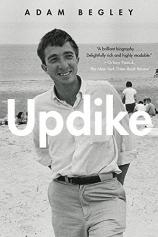Updike
Review
Updike
To refer to Adam Begley’s account of the literary life of John Updike as a biography would be akin to calling Updike’s beloved baseball hero, Ted Williams, a decent hitter. Williams was the greatest left-handed hitter in the history of the game, and Begley’s portrait of Updike is far more than a simple saga of a literary life. Updike often put himself on the pages of his novels, and Begley has done the same in recounting Updike’s life. A great American novelist deserved nothing less than a great biography, and Begley’s book meets that benchmark.
Begley was asked by HarperCollins to write Updike’s biography after publishing his obituary in the New York Observer. Upon his death, Begley wrote of the writer, “His best subject was John Updike.” Nine months after Updike’s death, his alma mater Harvard purchased his archives. For one year Begley took a look at drafts, galley proofs and uncompleted material. In addition, he read Updike’s correspondence with William Maxwell, his editor at the New Yorker and an accomplished writer.
"To refer to Adam Begley’s account of the literary life of John Updike as a biography would be akin to calling Updike’s beloved baseball hero, Ted Williams, a decent hitter.... John Updike was an outstanding writer, and Adam Begley’s chronicle of his life will be the standard for many future biographers."
Updike turned many personal experiences into pages for his readers. In 1983, Philadelphia journalist William Ecenbarger secured an interview with Updike, who later would publish in The New Yorker a story “One More Interview” based upon his day spent with Ecenbarger. In September 1960, Updike drove to Boston to spend an afternoon with his then paramour. She was not at home, so he spent that Wednesday afternoon at Fenway Park watching his idol Ted Williams play the final game of his career. “Hub Fans Bid Kid Adieu” is the most celebrated baseball essay written. As Begley notes, “John Updike wrote about himself naturally, then very quickly learned to write about himself professionally.” And write he did, as more than 60 novels, countless short stories for The New Yorker, poetry and cartoons can all be found in the Updike library.
Updike’s substantial lifetime of literary output can perhaps be explained using a baseball metaphor: he never suffered from an injury in his career. Many writers struggle through years of rejection and learning. Sometimes success is stifled by personal difficulty, alcohol issues, drug addiction or personal problems. The list of 20th-century writers who fall into that category is extensive, but Updike is not one of them. He did stutter and suffered from psoriasis, but nothing seemed to hamper his ability to write daily for several hours. His first story for The New Yorker was published when he was 23, and he continued to write without interruption until his death at age 77. He won almost every writing award available, save for the Nobel Prize.
While I have read many Updike novels and stories, I cannot claim to have the vast background of many who are Updike scholars. But I read what I like, and from the Updike collection, that meant turning my attention to the novels of Harry “Rabbit” Angstrom, his sports essays (especially his golf writing) and a few other works of fiction along the way. Many of his protagonists were like him --- they played golf, cheated on their wives, and had complicated family histories. Updike actually created a character who was a writer to allow himself to share with readers his insights into the profession. He loved to write and wanted nothing to interfere with that avocation. He returned to Harvard in the summer of 1962 to teach a course in creative writing, an experience he never repeated. “Teaching takes a lot of energy,” he observed in 1981. “It uses somehow the very brain cells that you should be writing with.”
No writer can be perfect. They write masterpieces and clunkers. They have warm personal relationships and sometimes create enemies. In the end, they leave readers with a sense of life that can be found only on the pages of great novels. John Updike was an outstanding writer, and Adam Begley’s chronicle of his life will be the standard for many future biographers.
Reviewed by Stuart Shiffman on April 10, 2014
Updike
- Publication Date: March 31, 2015
- Genres: Biography, Nonfiction
- Paperback: 592 pages
- Publisher: Harper Perennial
- ISBN-10: 0061896462
- ISBN-13: 9780061896460





